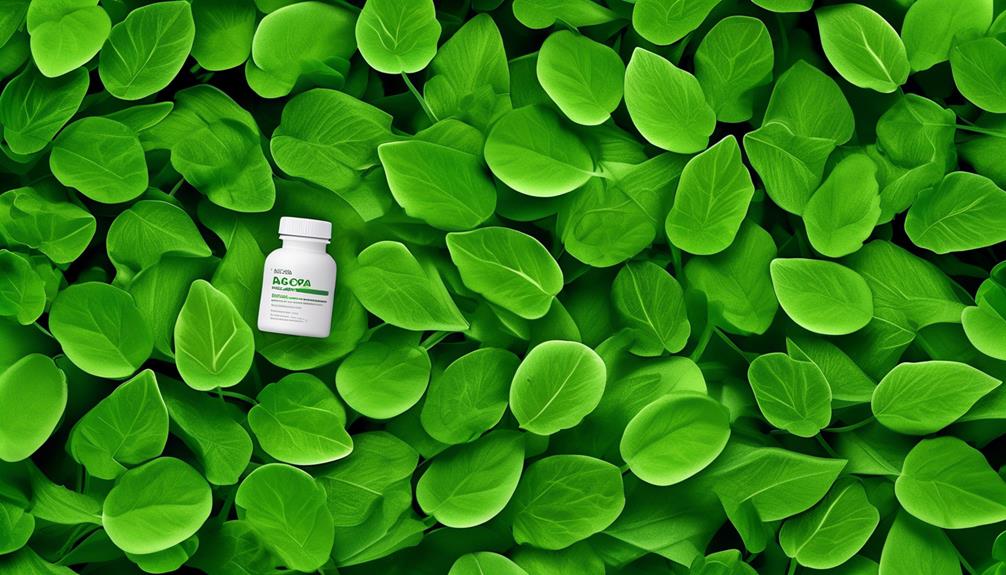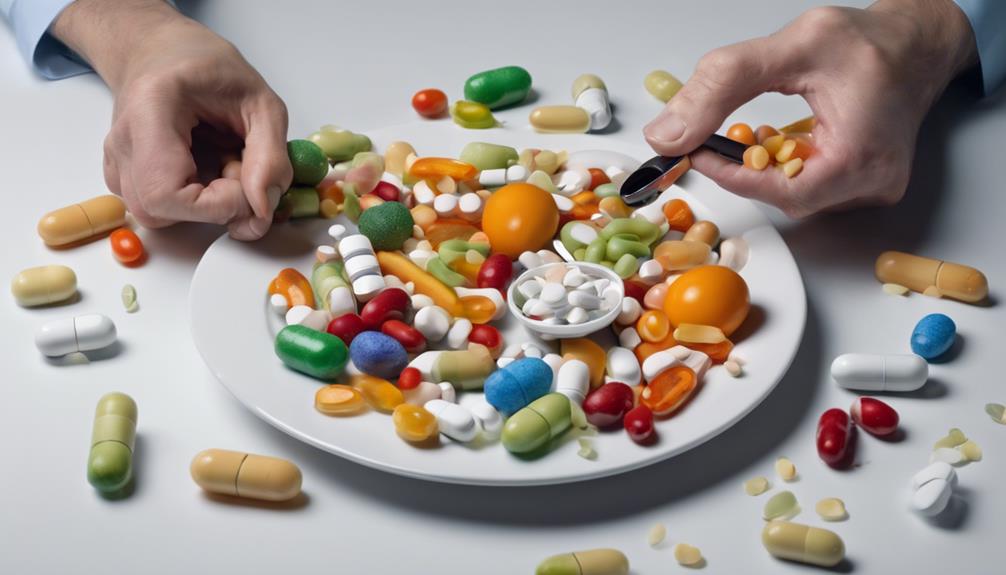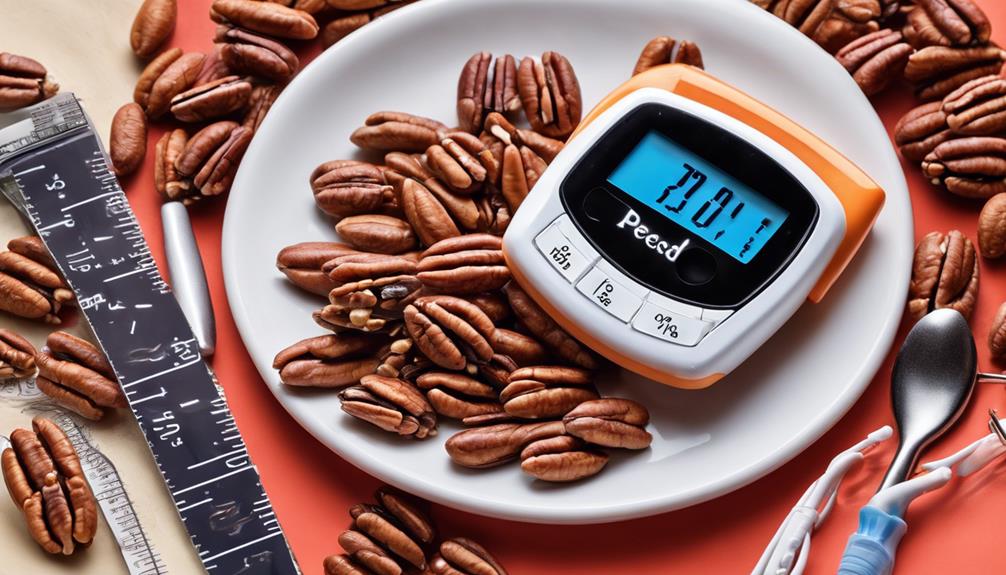Trying to decide what to eat while managing diabetes can often feel like trying to find your way through a maze.
Pickles, with their tangy crunch, have sparked curiosity among those seeking diabetes-friendly options.
But are they truly a hidden gem or a potential pitfall? Let's explore the impact of pickles on blood sugar levels and uncover whether they deserve a spot on the diabetic plate.
Key Takeaways
- Low-carb option with less than 2g carbs per 100g serving
- Vinegar aids in lowering blood sugar levels
- Choose dill pickles over sweet for lower sugar content
- Probiotic properties promote gut health and insulin sensitivity
Nutritional Benefits of Pickles for Diabetes
When managing diabetes, understanding the nutritional benefits of pickles can be crucial for making informed dietary choices. Pickles are a great low-carb option for individuals with diabetes, as a 100g serving of dill pickles contains less than 2g of carbs. The vinegar in pickles may also aid in lowering blood sugar levels, which can contribute to better diabetes management by impacting A1C levels positively.
Additionally, pickles are low in calories, making them a satisfying and guilt-free snack choice for those watching their weight and blood sugar.
Moreover, pickles are packed with antioxidants and vitamin C, offering potential health benefits for individuals with diabetes. These nutrients can help combat oxidative stress in the body, which is beneficial for overall health. To address the issue of high sodium content, it's advisable to opt for lower-sodium pickle varieties and consume them in moderation as part of a balanced diet tailored for diabetes management.
Glycemic Index and Pickles for Diabetics
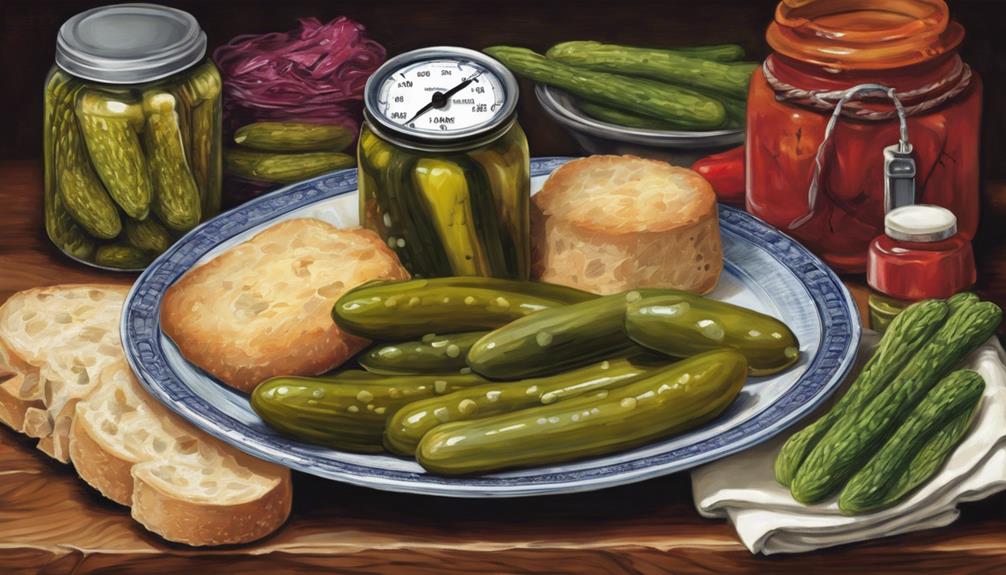
Exploring the glycemic index of pickles reveals their suitability as a diabetic-friendly food choice. Dill pickles, with a low glycemic index of 32, are a great option for individuals managing diabetes. The vinegar found in pickles may play a role in stabilizing blood sugar levels and enhancing insulin sensitivity, which can be beneficial for diabetics.
Opting for pickles without added sugars is recommended to minimize the impact on blood glucose levels. Including pickles in moderation as part of a balanced diet can be a smart approach for diabetes management. To enjoy pickles without causing spikes in blood sugar, it's essential to monitor portion sizes and select low-sodium varieties.
Whether store-bought or pickled at home, the consumption of pickles can be a flavorful addition to meals while supporting overall health. By incorporating pickles mindfully into your diet, you can harness their benefits without compromising your blood sugar control.
Probiotic Properties in Pickles for Diabetes
We've established the glycemic index benefits of dill pickles for diabetes; now, let's spotlight the probiotic properties within pickles that can further enhance health outcomes for individuals managing this condition. Pickles with probiotic properties offer several advantages for diabetics:
- Promoting Gut Health: Probiotics in pickles can improve gut health, crucial for overall well-being in diabetics.
- Enhancing Digestion and Nutrient Absorption: The probiotics present in pickles aid in better digestion and nutrient absorption, potentially supporting blood sugar control.
- Regulating Insulin Sensitivity and Reducing Inflammation: Consuming probiotic-rich pickles may help regulate insulin sensitivity and reduce inflammation, key factors in managing diabetes.
- Supporting a Healthy Balance of Gut Bacteria: Probiotic pickles contribute to a balanced gut microbiome, which can have positive effects on overall health in individuals with diabetes.
Incorporating probiotic pickles into the diet of diabetics may provide additional benefits beyond just managing blood sugar levels.
Safety of Pickles for Diabetics
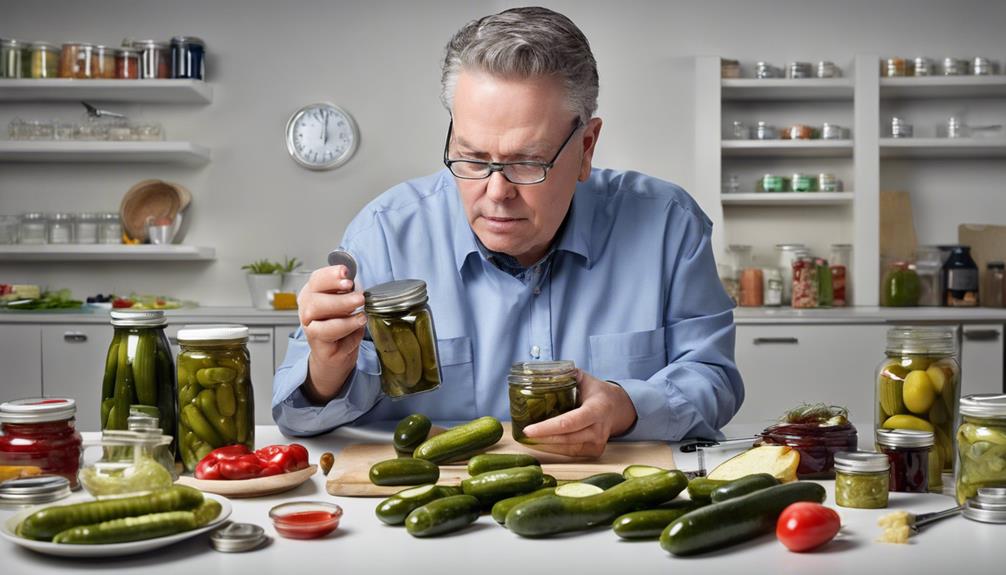
The safety of consuming pickles for individuals with diabetes depends on the type of pickles chosen and moderation in consumption due to varying sugar and sodium content.
Dill pickles are a better choice for diabetics as they contain less than 2g of carbs in a 100g serving and have the potential benefit of lowering blood A1C levels due to the vinegar content. On the other hand, sweet pickles have a higher sugar content, around 18.3g per 100g serving, which can lead to spikes in blood sugar levels and should be avoided by diabetics.
It's essential for individuals managing diabetes to opt for dill pickles over sweet pickles to support their health. However, moderation is key even with dill pickles due to the high sodium content present in some varieties.
Pickle Juice and Diabetes
Pickle juice has emerged as a potential ally for individuals managing diabetes, offering benefits in regulating blood sugar levels and aiding in overall blood sugar control. Here are some key points to consider when exploring the relationship between pickle juice and diabetes:
- Regulating Blood Sugar: The vinegar in pickle juice may help reduce blood sugar spikes after meals, promoting better blood glucose management.
- Lower A1C Scores: Consuming pickle juice has been associated with lower A1C scores, which is a positive outcome for individuals seeking effective diabetes management.
- Weight Loss: Pickle juice can contribute to weight loss, which is beneficial for overall blood sugar control and diabetes management.
- Moderation is Key: Including pickle juice in moderation as part of a balanced diet can be a safe and flavorful addition for individuals with diabetes.
Incorporating pickle juice into the diet can offer potential advantages in blood sugar regulation and overall diabetes care.
Frequently Asked Questions
What Foods Can Diabetics Eat Freely?
As diabetics, we can enjoy a variety of low-calorie and low-carb foods freely. Opt for nutrient-rich options like fresh herbs (basil, oregano, cilantro) and broths high in essential nutrients (calcium, magnesium).
Watch out for sodium content by choosing low-sodium or sodium-free options. Vinegar in pickles is another good choice due to its low calorie and sodium levels.
Embrace these delicious and healthy choices to support our well-being.
Are Cucumbers Good for Diabetics?
Cucumbers are excellent for diabetics due to their low carb content, aiding in blood sugar management. Rich in water and fiber, they promote satiety and digestion.
Packed with essential nutrients like vitamins K, potassium, and magnesium, cucumbers are a great addition to a balanced diet. Enjoy them raw in salads, as a snack, or infused in water for hydration without causing blood sugar spikes.
Embracing cucumbers can help diabetics maintain a healthy lifestyle.
How Many Pickles Can I Eat per Day?
We should be mindful of our pickle intake, especially with diabetes. It's recommended to limit consumption due to their high sodium content. Excessive pickles can lead to increased sodium levels, impacting blood pressure and overall health.
Consulting a healthcare provider or dietitian for personalized advice is crucial. Monitoring our pickle consumption is key to maintaining optimal health while managing diabetes.
Always prioritize moderation and seek professional guidance for a balanced diet.
Is Vinegar Good for Diabetics?
Vinegar can be beneficial for diabetics as it may help lower blood sugar levels and improve insulin sensitivity. Research has shown that consuming vinegar, like that found in pickles, is linked to lower A1C scores in individuals with diabetes.
The acetic acid in vinegar could slow carbohydrate absorption and decrease blood sugar spikes post-meals. It may also promote feelings of fullness and assist in weight management for diabetics. These potential benefits highlight the value of incorporating vinegar into the diet.
Conclusion
In conclusion, pickles can be a beneficial addition to a diabetes-friendly diet due to their low carbohydrate content and potential blood sugar management properties.
It's important to choose dill pickles over sweet pickles and opt for varieties lower in sodium.
Did you know that a study found that consuming vinegar, like that found in pickles, can improve insulin sensitivity by up to 34%?
Remember to consult with your healthcare provider for personalized dietary advice.

